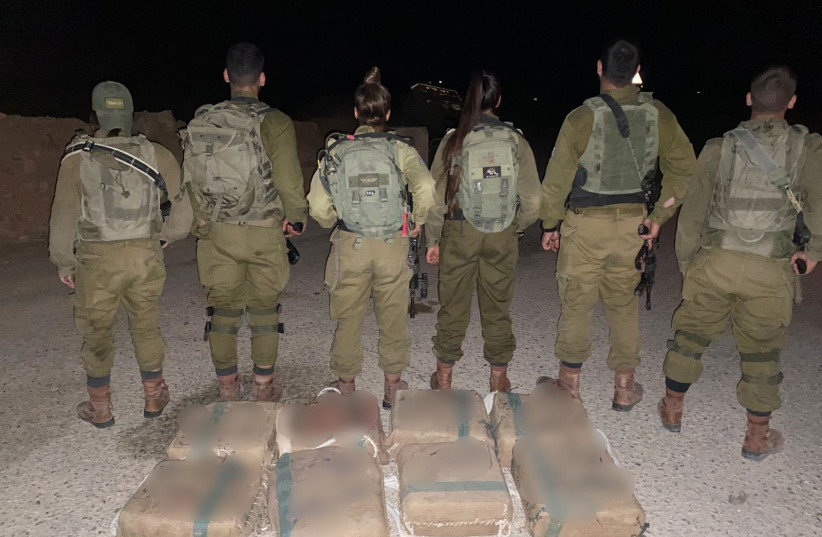With drug-related violence in Israel’s Negev Desert rampant, the IDF and other security bodies are continuing to crack down on drug-smuggling and marijuana-growing greenhouses in the South, destroying more than 2,000 such facilities in the past year and thwarting dozens of smuggling attempts, the IDF said.
The IDF and the Israel Police launched the Magen HaNegev program last year to crack down on lawlessness and drug- and weapons-smuggling along the Egyptian border and improve overall security in the Negev.
According to the military and the police, weapons and drug smuggling have been rampant in the Negev for decades, but the military has only recently begun to view it as a risk to national security. This is due in part to the surge in violence committed during smuggling attempts and weapons thefts from IDF bases.
The smuggling is carried out mainly by young men from communities in the Negev where there is little or no police presence, coupled with low employment, stolen weapons and the opportunity to make easy money.
Some 210,000 Bedouin live in the Negev, including 90,000 in unrecognized villages that are largely cut off from basic municipal services and in structures that were built without permits, placing them at risk of demolition by the authorities.

Those living in these unrecognized villages suffer from extraordinarily high rates of unemployment and crime. With many living below the poverty line, the money that one can make by joining smuggling rings or stealing weapons from IDF bases is what drives the Bedouin smugglers.
The government’s coalition agreement included a five-year comprehensive plan with a budget of NIS 30 billion ($9.3b.) to reduce socioeconomic gaps within the Bedouin community and the rest of the country, as well as a commitment to reign in the violence and crime that has been surging within Arab-Israeli society. But nothing has been done.
According to the IDF, Israeli smugglers can make a profit of $50,000-$70,000 in one smuggling attempt that has up-front costs of $150,000, while those on the Egyptian side of the border fence can profit $25,000-$35,000 for an attempt with an initial cost of $50,000.
With the ability to make easy money, drug and weapons smuggling is a popular occupation for those living in the Negev. But the illegal activity and violence that comes along with these crimes have led security bodies to crack down, working daily to thwart crime and bring a feeling of security to residents of the South.
At the beginning of the year, security agencies carried out what they described as a significant operation and destroyed 40 greenhouses that had been found in IDF firing zones, along with the related infrastructure needed to grow marijuana.
Over the course of 2021-2022, more than 2,000 active greenhouses were destroyed by security services, The Jerusalem Post has learned. In 2021, more than 1,200 active greenhouses were destroyed. Many more inactive greenhouses and related equipment were also destroyed or seized by security forces, the sources said.
OVER THE YEARS, the 240-km. (150-mile) border between Israel and Egypt’s Sinai Peninsula has seen countless drug- and weapons-smuggling attempts by Bedouin.
In 2019, there were 350 smuggling attempts identified, with 30 of them thwarted. In 2020, out of 280 smuggling attempts, the IDF thwarted 57 and confiscated close to 400 large bags of drugs, 20 cars and arrested some 20 smugglers. In 2021, there were 180 attempts identified, and 60 were thwarted.
The total amount of drugs being smuggled has decreased 36%, down from 33 tons valued at NIS 1.86 billion in 2020 to 21 tons valued at NIS 1.2b. in 2021. In 2019, the amount of drugs smuggled into Israel was valued at an estimated NIS 4b.
So far in 2022, several smuggling attempts along the Egyptian border have been thwarted. Last week, troops foiled an attempt to smuggle more than 200 kg. (440 lbs.) of marijuana and hashish estimated to be worth NIS 4m. ($1.2m.).
Most of the smuggling is attempted in the middle of the night. According to security officers, there is not one arrest that does not end in violence or where the suspects disappear into the vast Negev Desert.
Violence remains a major concern for soldiers who are stationed along the border and have been fired upon during the smuggling attempts.
In a recent interview with the Post, Lt. Danielle Shalom, who is stationed along the border with her troops from the Bardelas Battalion, said smugglers have also used rocket-propelled grenades, heavy machine guns and other weaponry against soldiers.
“On a day-to-day threat level, ISIS is less of a threat,” she said. “It’s the criminal smugglers who are more worrisome. They fire at us, and it’s a matter of life and death. At the end of the day, it’s not really any different than someone who crosses the border to carry out a terrorist attack.”
One smuggling attempt in late January left two undercover police officers wounded after troops from the Caracal Battalion opened fire when they mistakenly identified a vehicle as belonging to smugglers and fired toward its wheels.
The incident occurred after smugglers on the Egyptian side of the border drove up to the fence in armored vehicles with machine guns mounted on top and opened massive amounts of gunfire toward Israel in an attempt to deter soldiers from approaching the area.
Nine smuggling attempts were thwarted that night, and security forces seized approximately 400 kg. of drugs valued at NIS 8m., making it “one of the most active nights on the Egyptian border in recent memory,” the IDF said.
Despite the recent violent smuggling attempts, smuggling has decreased because of extensive missions by security bodies, including the police, the Shin Bet (Israel Security Agency) and the Israel Nature and Parks Authority, a senior official with knowledge of the military’s campaign said.
“This is a battle for the Negev... When we cooperate, we are able to reduce this phenomenon,” the official said.
